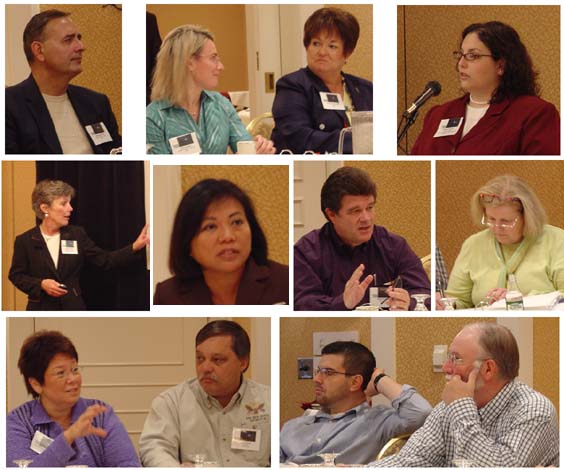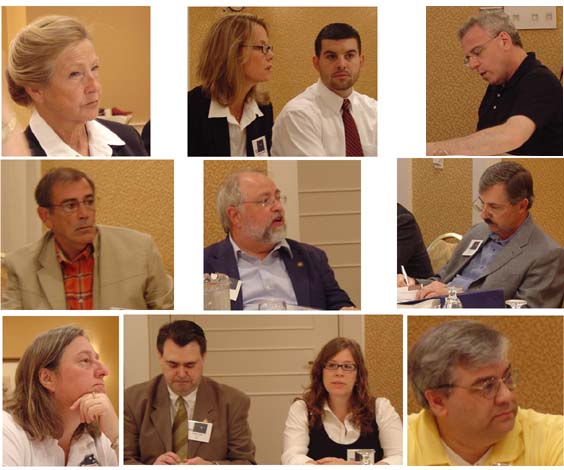Phil Barnhart
State Representative
Oregon House of Representatives
Eugene, Oregon
Dave
Bradley
Representative
Arizona State Legislature
Tucson, Arizona
Charlotte
Burks
Senator
Tennessee State Senate
Monterrey, Tennessee
Richard
Burns
Budget and Policy Analyst
Idaho State Legislature
Boise, Idaho
Ridia
T. R. Cabanilla
Representative
Hawaii State Legislature
Honolulu, Hawaii
Amy
Castro
Legislative
Budget and Policy
Idaho State Legislature
Boise, Idaho
Aaron
Catlin
Director of Government Affairs, Speaker
Chief of Staff, House Majority Leader
Kansas State Legislature
Topeka, Kansas
Steve
Christian
Program Director
National Conference of State Legislatures
Denver, Colorado
Brian
A. Crain
Senator
Oklahoma State Senate
Oklahoma City, Oklahoma
Dick
Dever
Senator
North Dakota State Legislature
Bismarck, North Dakota
Jeffrey
Dinowitz
Assemblyman
New York State Assembly
Bronx, New York
|
|
Johnny
Ellis
Senator
Alaska State Legislature
Anchorage, Alaska
John
Esp
Senator
Montana State Legislature
Big Timber, Montana
Gary
Hansen
Representative
Oregon House of Representatives
Portland, Oregon
Margaret
Henbest
Representative
Idaho State Legislature
Boise, Idaho
Katherine
Herring
Legislative Aide
Alaska State Legislature
Anchorage, Alaska
Patti
Anne Lodge
Senator
Idaho State Legislature
Huston, Idaho
Ricia
McMahon
Representative
New Hampshire General Court
North Sutton, New Hampshire
Cynthia
M. Perry
Executive Director, Select Committe on Children and Youth
Tennessee General Assembly
Nashville, Tennessee
Yvonne
Prettner Solon
Senator
Minnesota State Senate
Duluth, Minnesota
Bill
Warden
Representative
Montana State Legislature
Bozeman, Montana
|
On the history of drug abuse and addicition in the U.S.:
"Very good history introduction to tremendous problem."
On
neuroscience and public policy:
"Answered many of my basic questions with grace and language
and research even I could understand!"
On
the public costs of substance abuse:
""
On
the effectiveness of treatment:
"This was really good. Her comparison with hypertension
really allowed me to better understand the need to keep trying with
the substance abuser."
"Great stuff - helped to change my mind/thought process regarding
addiction as disease (treated medically etc.) vs. moral failure."
On
visiting a treatment center:
"I enjoyed hearing from the people who worked at the treatment
center. Also the clients were entertaining. My ideas about methadone
have changed."
"Good program information and examples of 'success.'"
"This was great for those who questioned the need for continuing
care."
On
personal reflections on addiction:
"I was glad this was part of the program."
"Gary was extremely brave and I appreciated the story."
On
alcohol and the adolescent brain:
"I wish I had learned this when I had my young children. Excellent
insight. I understand more about teenagers. This is valuable for parents
and educators."
"Excellent presentation."
On
effective policies for drug offenders:
"Great overview - important information regarding focus
of interventions."
"Another outstanding program. Pertinent information presented in
a reasonable manner with plenty of time for questions makes for an interesting
and educational program."
On
methamphetimine and its effects:
"Thanks for all the information. This helps bring all this valuable
information into perspective. Meth is especially a large problem in
the west and this presentation was enlightening especially the brain
activities."
"Great information. Presented in a way that allowed for easy learning."
|
|
On
the economics of treatment:
"Economics is one of the main factors preventing treatment
in our state. I liked the presentation for CDA,CEA,SWA. I now understand
how to equate cost on the various levels."
"Good for policy arguments regarding cost benefits to treatment."
On
investing in treatment to contain other costs:
"Good presenter. Easy to understand and to talk to. Material
content appeared duplicative of previous presentation, i.e. government
makes a good investment when it invests in treatment."
"This needed more time. Could have been the most important topic
- how do we as legislators achieve the result this whole exercise has
suggested?"
Overall
impressions:
"Well organized, helpful materials, thoughtful, informative
speakers. It was great to hear about addiction from an economic, scientific,
and political standpoint."
"Best overall group of speakers I have heard at a workshop."
"I learned much that I did not know or understand before. I wish
they were available to many other policy people."
" A total change in my knowledge. I also now want to look for quality
of treatment programs."
How
participants think the workshop will help them with making policy regarding
substance abuse:
"I think it may help make better cases for priorities
within the budget."
"I rely heavily on our Department of Mental Health to explain the
need for these programs. This seminar will assist me to better understand
their explanations."
"I don't sponsor legislation. However, I'm much better prepared
to speak to issues and policy makers regarding this subject."
"I will look at a more comprehensive approach to these issues."
What
participants liked most about the workshop:
"I
liked the format and presenters. The information was excellent. I liked
the atmosphere and the ability to ask questions any time. Also the easy
access to the presenters."
"Brain development/neuroscience presentations, Information to help
know what programs are effective - seeing evidence that treatment does
work."
"The speakers were all very interesting and informative. I liked
the fact that many topics were covered - I would have liked even more."
"Scientific research was great, but the clinic visit transformed
my thinking more than anything."
|
David Friedman, Ph.D.
Director, Addiction Studies Program for Journalists
Professor
Department of Physiology and Pharmacology
Wake Forest University School of Medicine
Winston-Salem, North Carolina Sue
Rusche
Co-Director
Addiction Studies Program for Journalists
Chairman, President, and CEO
National Families in Action
Atlanta, Georgia
A.
Tom McLellan, Ph.D.
Director, Treatment Research Institute
University of Pennsylvania
Philadelphia, Pennsylvania
Allison
C. Colker, J.D., Esq.
Program Manager
National Conference of State Legislatures
Washington, D.C.
Bonnie
Catone
Director of Communications
Treatment Research Institute
University of Pennsylvania
Philadelphia, Pennsylvania
Timothy
P. Condon, Ph.D.
Deputy Director, NIDA
Bethesda, Maryland
|
|
Douglas
B. Marlowe, J.D., Ph.D.
Director,
Section on Criminal Justice Research
Treatment
Research Institute
University of Pennsylvania
Philadelphia, Pennsylvania
Ted
R. Miller, Ph.D.
Principal Research Associate
Pacific Institute for Research and Evaluation
Calverton, Maryland
Kenneth
D. Stark, M.Ed., MBA
Director, Mental Health Transformation Project
Office of the Governor
Olympia, Washington
Ken
C. Winters, Ph.D.
Professor, Department of Psychiatry
Director, Center for Adolescent Substance Abuse Research
Univeristy of Minnesota
Minneapolis, Minnesota
Gary
Zarkin, Ph.D.
Director, Behavioral Health and Criminal Justice Research Division
RTI International
Research Triangle Park, North Carolina
|
Wednesday, September 13
8:00
Welcome and Introductions
Allison Colker
8:15
A History of Drug Abuse and Addiction in the U.S.
Sue Rusche
9:15
Can Neuroscience Influence Policy?
David Friedman
10:45
Break
11:00
Risky Business: Prevention Cuts, Public Costs, and Industry Profits
Ted Miller
12:30
Lunch
1:30
Substance Abuse Treatment: What Is It? Why Does It Seem Ineffective?
Bonnie Catone
3:30
Visit to a Treatment Center
6:30
Dinner
Speaker, Representative Gary Hansen, Oregon |
|
Thursday, September 14
8:00
Alcohol and the Adolescent Brain: Tastes Great, Less Functioning
Ken Winters
9:30
Break
9:45
Effective Policies for Drug Offenders
Doug Marlowe
11:15
Break
11:30
Methamphetamine: How it Influences the Brain and Behavior of Users and
Treatment Implications
Tim Condon
1:00
Lunch
2:00
Economics of Substance Abuse Treatment
Gary Zarkin
3:30
Break
3:45
Expanding Alcohol/Drug Treatment: An Investment in Health Care Cost
Containment and Public Safety
Ken Stark
4:30
Evaluations
5:00
Adjourn
|



